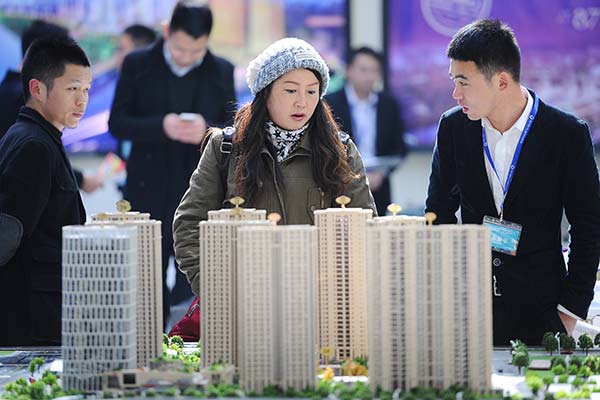New home price growth slows


Rates decline in Beijing, Shanghai, Guangzhou and Shenzhen in Feb
New home price growth slowed in February from the previous month in 70 major Chinese cities tracked by the National Bureau of Statistics, as a series of cooling measures helped rein in property prices in big cities, even as smaller cities continued to show resilience.
Compared with January, a total of 16 cities reported declines in new-home prices in February. Prices in 10 cities remained unchanged, while 44 recorded gains. The four first-tier cities of Beijing, Shanghai, Guangzhou and Shenzhen saw new-home prices decline mildly ranging from 0.2 to 0.6 percentage point from a month ago, according to NBS data published on Monday.
The stabilized residential property market is largely due to the cooling measures enacted by local governments and the continuity of housing policies, said Liu Jianwei, a senior statistician at the NBS.
"Among the 15 cities with harsh restrictions, only Tianjin reported a price rise (month-on-month), showing that the macro control policies in these cities have been effective," said Zhang Dawei, chief analyst at Centaline Property Agency Ltd.
In February, new home prices of China's first-tier cities declined 0.1 percent year-on-year, while used home price growth rate declined for the 17 month in a row, by 0.6 percentage point from a month ago, according to Liu.
In second-tier cities including Nanjing, Hangzhou, Hefei and Fuzhou, new home price growth rate edged down 0.2 percentage point month-on-month, and that for used homes grew by 0.1 percentage point. On a year-on-year basis, new home price growth rate was 0.4 percentage point, and that of used homes was 0.1 percentage point.
Smaller cities showed resilience in underpinning home prices and many of them reported growth in both new home and existing residential prices.
A total of 44 cities out of the 70 major cities the NBS monitored across the nation reported a month-on-month new home price rise in February, with Nanchong of Sichuan province taking the lead with a 1.7 percent gain. Compared with last year, 59 cities reported price rises, and eight cities' growth rate was above 10 percent.
Experts said China will continue its pursuit of a stable and healthy development of the property market this year, and emphasized that homes are for living and not for speculative investment.
"Tightening policies for the residential market are spreading to third- and fourth-tier cities, as more than 40 cities have published over 50 macro control policies since this year," Zhang said.
Premier Li Keqiang announced earlier this month that the country is also steadily pushing for the legislation of a property tax this year, which experts expect to be completed by 2020.



































